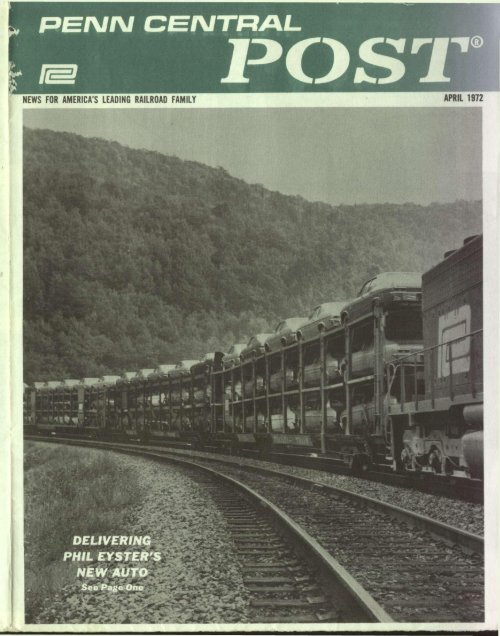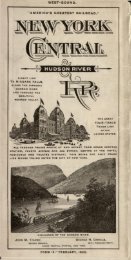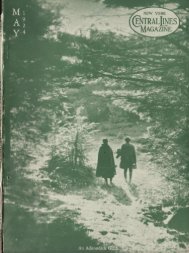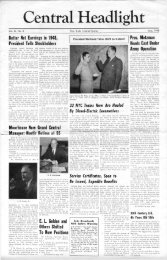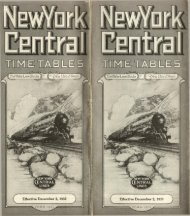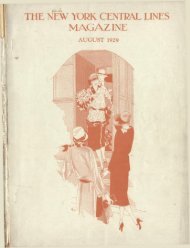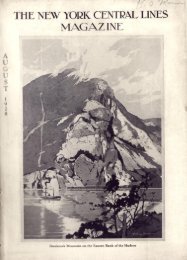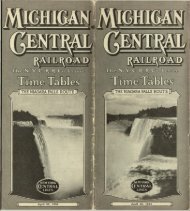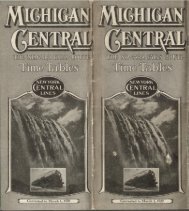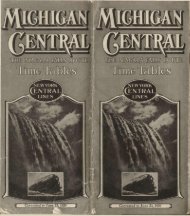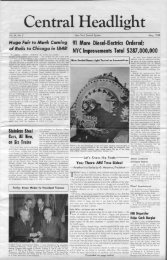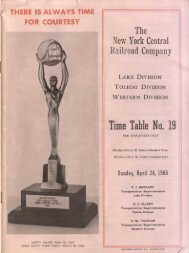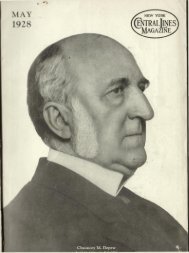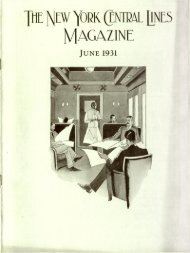What're you doing, Bob Bailey? This isn't your thing.
What're you doing, Bob Bailey? This isn't your thing.
What're you doing, Bob Bailey? This isn't your thing.
You also want an ePaper? Increase the reach of your titles
YUMPU automatically turns print PDFs into web optimized ePapers that Google loves.
Delivering<br />
new vehicles for<br />
2.000.000<br />
customers<br />
Philip H. Eyster, a Penn Central<br />
freight clerk, bought a new<br />
auto a few months ago.<br />
It has power brakes. Power<br />
steering. Air conditioning. Vinyl<br />
top.<br />
Phil and his wife, Kathryn, are<br />
very proud of it.<br />
They're also happy about the<br />
way the auto was delivered—without<br />
a scratch.<br />
It was transported from the<br />
manufacturer by Penn Central<br />
freight service.<br />
"They took good care of it,"<br />
says Mrs. Eyster.<br />
The Eysters' car was among<br />
approximately 2,000,000 new vehicles<br />
delivered by Penn Central<br />
At Linden, N.J., Car Inspector William H.<br />
De Rose makes sure autos are properly se<br />
cured before the train moves out of yard.<br />
At Detroit, Mich., Rosemary Brodowski<br />
views microfilm to verify whether certain<br />
autos moved out on a specific flatcar.<br />
Prompt, expert repair of the rail cars<br />
helps auto shipments move on time. Willie<br />
Billington works at North Yard, Detroit.<br />
(including Phil Eyster)<br />
freight trains during the past<br />
year.<br />
"Hauling this traffic is one of<br />
the biggest and most demanding<br />
assignments on our railroad," says<br />
Daryl R. Stone, PC's director of<br />
automobile terminals.<br />
"It's a very important source of<br />
revenue—amounting to more than<br />
$80 million last year.<br />
"It's traffic that has grown<br />
steadily in recent years—and we<br />
want to keep it growing.<br />
"But we have to surmount some<br />
serious problems."<br />
The unhappy fact is that not all<br />
the autos are delivered in the same<br />
perfect shape as the Eislers' new<br />
car, Mr. Stone states.<br />
Scratches, dents, windows broken<br />
by vandals, and missing parts, apparently<br />
stolen, are listed on inspection<br />
sheets at destination terminals.<br />
"The auto manufacturers would<br />
like to continue shipping on our<br />
rails, but they're demanding that<br />
we correct this situation," Mr.<br />
Stone emphasizes.<br />
"In plain words: Our ability to<br />
hold on to this valuable traffic depends<br />
on our ability to curb loss<br />
and damage."<br />
Daryl Stone is a husky fellow<br />
who grew up on a northern Pennsylvania<br />
farm near Renovo, and<br />
was driving a tractor at the age<br />
of nine. His interest in machinery<br />
led him to an apprenticeship in<br />
the PRR shops and subsequent<br />
promotions in the Maintenance-of-<br />
Equipment Department.<br />
In December, 1970, he was<br />
named to head Penn Central's new<br />
Automobile Terminal Department<br />
—first organization of its kind on<br />
American railroads. Mr. Stone reports<br />
to J.H. Sharp, Assistant Vice<br />
President-Yards and Terminals.<br />
The department's assignment<br />
is to oversee all aspects of the<br />
handling of new autos and trucks<br />
for safe and efficient movement<br />
from the assembly plant to<br />
destination.<br />
A new department was also set<br />
up by Sales & Marketing. Called<br />
the Automotive Department, and<br />
Conductor John A. Staltari guides carloads of new autos from busy plant at Linden, N.J.<br />
Freight Clerk Philip H. Eyster and his wife pose with their brand new car. It came by rail.<br />
headed by Assistant Vice President<br />
Thomas B. Graves, Jr., its<br />
function is to meet the needs of the<br />
automobile industry in regard to<br />
sales and service, marketing, pricing,<br />
and equipment planning. In<br />
short, Tom Graves' staff is responsible<br />
for selling Penn Central's<br />
service, pricing the service, and<br />
developing new business.<br />
PC's Real Estate and Industrial<br />
Development departments also<br />
get involved by helping the auto<br />
makers find new plant locations.<br />
The Engineering Department provides<br />
needed sidings. The Mechanical<br />
Department keeps the autocarrying<br />
flatcars in repair and<br />
works on improved methods of loading<br />
and tie-down.<br />
The Freight Claims and Prevention<br />
Department carefully matches<br />
inspection reports with damage<br />
claims, in order to identify the portions<br />
that are not the railroad's<br />
responsibility. In cases of railroad<br />
liability, claims are being<br />
processed more expeditiously than<br />
ever before. The damage prevention<br />
personnel work closely with<br />
auto manufacturers in defining<br />
transportation problems and recommending<br />
solutions.<br />
"So <strong>you</strong> see, a lot of people get<br />
Little Ferry Yard in North Jersey, one of 36 PC auto terminals, can hold 3800 vehicles.<br />
Careful, kid-glove coupling prevents dam<br />
age. Engineer J. H. Kelley takes signals<br />
from Brakeman John Wojcik at Detroit.<br />
into the act," says Tom Graves.<br />
"But what all this effort is aimed<br />
toward is simply this: On-time,<br />
damage-free delivery. That's what<br />
pays off."<br />
Across the Penn Central System<br />
are 36 terminals where new<br />
automobiles, trucks and other vehicles<br />
are loaded onto railroad<br />
cars or unloaded for delivery.<br />
These are bustling places, filled<br />
with the gleam and glitter of the<br />
newest products of General Motors,<br />
Ford, Chrysler, American Motors,<br />
International Harvester, plus various<br />
imported cars. You'll see fleets<br />
of new taxis. Army vehicles. Postoffice<br />
trucks. Cars for police departments.<br />
Farm tractors. Buses. Even<br />
golf carts.<br />
PC employes make out a condition<br />
report on each vehicle as<br />
it's received from the manufacturer.<br />
A similar inspection report is<br />
made out when the vehicle is unloaded<br />
at the destination terminal.<br />
<strong>This</strong> tells whether any<strong>thing</strong> has<br />
happened to the vehicle enroute.<br />
Continued on Page Two
Continued from Page One<br />
Terminal employes who drive the<br />
vehicles on and off the railroad<br />
cars have the sensitive job of<br />
avoiding dents and scratches.<br />
They're also responsible for the<br />
tie-down that secures the vehicle<br />
for rail movement.<br />
Car inspectors double-check the<br />
tie-downs and the condition of the<br />
railroad cars before they move out.<br />
Yard crews have the crucial responsibility<br />
of preventing harsh<br />
impacts during coupling.<br />
Road freight crews are counted<br />
on for smooth starts and stops,<br />
avoidance of slack action, and<br />
vigilance against dislodgement of<br />
the autos, and against vandals and<br />
thieves.<br />
"Penn Central's security officers<br />
need the help of all of us in the<br />
complex task of protecting these<br />
high-value shipments," says Daryl<br />
Stone.<br />
"New autos seem to be magnets<br />
for vandals and thieves. Some<br />
At Lincoln Yard, Detroit, Jack Proctor<br />
makes out inspection report on each new<br />
auto before it moves out in a PC train.<br />
En route, thieves removed parts from this<br />
auto. Inspection is being made by William<br />
F. Watson and Dan Noto, Newark, N.J.<br />
2<br />
M. M. Demasi, GM's resident traffic manager, discusses car handling with D. R. Stone, PC<br />
director—auto terminals; R. L. Graeber, supervisor, J. F. Mizzi, manager—auto terminals.<br />
throw rocks. Others break into the<br />
autos to take spare tires, radios or<br />
batteries.<br />
"When <strong>you</strong> consider all the work<br />
and care that goes into building a<br />
new auto, it's heartbreaking to see<br />
the same auto battered by some<br />
hoodlum."<br />
Whenever a rail car loaded with<br />
new vehicles is standing still, it's<br />
vulnerable, points out Donald L.<br />
Nelson, Penn Central's director of<br />
security.<br />
"It deserves a watchful eye from<br />
every PC employe in the vicinity<br />
—that's our bread and butter sitting<br />
out there.<br />
"Any trespasser, any unknown<br />
person, should be reported immediately<br />
to the nearest Penn<br />
Central office, so our police can take<br />
appropriate action."<br />
Alertness of Penn Central trackmen<br />
near Lorain, Ohio, recently<br />
helped crack a tire-stealing racket,<br />
Mr. Nelson says.<br />
The trackmen found new tires<br />
hidden in bushes and promptly reported<br />
them. PC Security officers<br />
and local police set up surveillance.<br />
They caught two men who had<br />
been taking spare tires out of the<br />
trunks of new autos awaiting shipment<br />
overnight.<br />
Alertness of employes at Selkirk,<br />
<strong>This</strong> auto, which traveled the rails to Mich<br />
igan, was the victim of rock-tossers.<br />
<strong>Bob</strong> Weir examines extent of the damage.<br />
N.Y., led to the arrest of an intruder<br />
who was stealing car radios and<br />
stereos.<br />
At PC's auto terminal in Earnest,<br />
Pa., one of the terminal's<br />
own employes was arrested by PC<br />
police for taking spare tires from<br />
new autos. He has lost his job and<br />
now faces court action on a charge<br />
of larceny.<br />
Mr. Nelson says:<br />
"When a train hauling new autos<br />
has to slow down or stop on the<br />
road, that's an opportunity for a<br />
thief to climb aboard and break<br />
into an auto. Once aboard, he can<br />
often work undetected.<br />
"That's why we urgently rely<br />
on our train crews to be particularly<br />
watchful during any slowing<br />
or stopping, and to send word by<br />
radio or otherwise to the nearest<br />
tower or dispatcher if thieves or<br />
vandals are spotted."<br />
Penn Central has been taking<br />
many steps to counter theft and<br />
vandalism. Fences around auto terminals<br />
have been upgraded. Bushes<br />
providing concealment have been<br />
At destination terminal, PC's William P.<br />
White and haulaway driver Wilfred Gon<br />
zalez make a joint inspection before auto<br />
is driven over highway to local dealer.<br />
cut down. There is close check of<br />
vehicles and people moving in and<br />
out of the terminals.<br />
Schedules have been changed so<br />
that auto-carrying trains don't go<br />
through big-city areas during the<br />
hours when vandalism and theft<br />
are most likely to occur.<br />
Experiments are being conducted<br />
with new methods of covering<br />
and enclosing autos on rail cars.<br />
Auto inspection reports will soon<br />
be computerized to pinpoint problem<br />
locations quickly.<br />
Says Daryl Stone:<br />
"A dozen years ago, there were<br />
very few autos and trucks shipped<br />
by rail. Today it's big business for<br />
us.<br />
"To keep it—and keep it growing—we<br />
know we've got to do a<br />
good job, better than we've been<br />
<strong>doing</strong>.<br />
"With the help of Penn Central<br />
people, I'm sure we can."<br />
Sprucing up, fixing up, for proper han<br />
dling of autos: Robert Slater and Dom-<br />
inick Lospoto repaint a movable ramp at<br />
Little Ferry Yard, near Ridgefield, N.J.<br />
Sam Wenzer, manager of damage analy<br />
sis, and NJ. Goettelman, senior claim<br />
representative, review current survey.<br />
Health and Welfare Benefits Are Expanded<br />
The Nation's railroads have<br />
reached agreement with rail<br />
unions on a new two-year health<br />
and welfare plan, providing expanded<br />
benefits for approximately<br />
525,000 employes.<br />
The new plan is "one of the<br />
most comprehensive in all industry,"<br />
said William H. Dempsey,<br />
chairman of the National Railway<br />
Labor Conference, which represents<br />
the railroads in collective<br />
bargaining.<br />
The cost to the railroads will<br />
now go up from the previous $255<br />
million per year to $340 million.<br />
The policy is written by Travelers<br />
Insurance Company. The<br />
railroads pay the entire cost; employes<br />
do not contribute.<br />
Because Penn Central Trans<br />
portation Company is in reorganization<br />
under the Federal Bankruptcy<br />
Act, the health and welfare<br />
agreement is subject to approval<br />
of the U.S. District Court.<br />
The new policy includes the following<br />
changes:<br />
• Increase maximum hospital<br />
days from 180 to 365 per confinement.<br />
• Increase lifetime maximum<br />
major-medical coverage from the<br />
former $20,000 to $50,000.<br />
• Increase automatic restoration<br />
on major-medical from $1,000<br />
to $2,000 per year.<br />
• Provide for intensive-care<br />
excess charges to be handled as<br />
hospital miscellaneous charges.<br />
• Increase surgical schedule<br />
from $550 to $650.<br />
• Increase anesthesia benefits<br />
by 25 percent.<br />
• Continue insurance for pregnant<br />
female employes for five full<br />
months following the month last<br />
worked, with provision for 14<br />
days' coverage of newborn children<br />
if birth occurs thereafter.<br />
• Add provision for new period<br />
of hospital confinement for employes<br />
and dependents to begin<br />
30 days after release from hospital.<br />
• Provide immediate reinstatement<br />
of insurance for returning<br />
veterans, with immediate maternity<br />
benefits for their wives.<br />
• Continue coverage for dismissed<br />
employes the same as for<br />
furloughed employes, except that<br />
the employe must have had not<br />
less than six months' employment<br />
prior to discharge, during which<br />
time the employe qualified for at<br />
least three premium payments.<br />
• Increase major medical payment<br />
for out-of-hospital psychiatric<br />
care from 50 percent to 65.<br />
These unions on Penn Centra]<br />
are parties to the agreement:<br />
Machinists, Boilermakers &<br />
Blacksmiths, Sheet Metal Workers,<br />
Electrical Workers, Firemen<br />
& Oilers, Clerks, Maintenance of<br />
Way, Signalmen, Dining Car,<br />
United Transportation Union (E,<br />
C and T), Locomotive Engineers,<br />
Train Dispatchers, Yardmasters,<br />
Transport Workers, Masters,<br />
Mates & Pilots, National Maritime,<br />
Supervisors, Sleeping Car<br />
Porters.
RESCUE AT HARTFORD, CONN.: Yard Brakeman Ernest L. Crane, Jr.,<br />
was driving to work with a friend, when he noticed two boys trying to<br />
flag down passing autos. "Please help us," the boys called out. The motorists<br />
kept going. Brakeman Crane stopped.<br />
The boys told him another boy and a girl had fallen through the ice in a<br />
nearby pond. Mr. Crane ran out of his car and onto the ice-covered pond.<br />
He crashed through the ice, but struggled ahead to where he saw a head<br />
bobbing. He found the boy and pulled him out, then went back for the girl,<br />
but couldn't locate her. A fire company arrived and found her dead under<br />
six feet of water.<br />
Brakeman Crane's swift action, which saved a 13-year-old boy from<br />
drowning, was hailed by fellow railroaders. In the photo, Assistant Trainmaster<br />
Paul E. O'Neill and Clerk-Stenographer Dolores P. Palme watch<br />
Trainmaster Joseph F. Daly (right) present Mr. Crane with a $50 Bond.<br />
BUZZING AT EUCLID, OHIO: At<br />
work in Collinwood Yard, Brakeman<br />
Victor Koncilja (right) directs<br />
freight cars. After work, he directs<br />
bees. He estimates there are 1,500,-<br />
000 buzzing around his 13 hives.<br />
They produce a lot of honey for his<br />
family and for sale. He also gives<br />
lectures about bees, which he considers<br />
among Nature's gentlest<br />
creatures—if treated gently. And<br />
he considers the bees' product a<br />
particularly ideal food. Mr. Koncilja<br />
got interested in the subject<br />
nine years ago when he found a<br />
swarm hanging on a tree on Kis<br />
property. He managed to coax the<br />
swarm into a makeshift hive. His<br />
hobby has been buzzing ever since.<br />
SYSTEM OFFICES<br />
Engineering<br />
Steel, E. H., Jr. Senior Structural Engineer,<br />
Pittsburgh<br />
Willing, B. J. General Supervisor-<br />
Maintenance of Facilities, Toledo, O.<br />
Equipment<br />
Boughton, J. W. General Supt. Shops,<br />
Collinwood, O.<br />
Kane, L. L. Supervisor-Inspection<br />
Finance<br />
& Accounting<br />
Alberts, E. M. Customer Account Auditor<br />
Diamond, R. J.<br />
Supervisor—<br />
TrailVan Accounting Policy<br />
Dolish, R. C.<br />
Area Credit Manager<br />
Elwood, W. C. Area Customer Account<br />
Auditor, Pittsburgh<br />
Fallon, J. J.<br />
Customer Account Auditor<br />
Felarca, S. J. Area Customer Account Auditor,<br />
Detroit, Mich.<br />
Klimsak, J. G. Asst. Supervisor Local &<br />
Interline Accts., Detroit, Mich.<br />
McDowell, E. J. Asst. Collection Manager<br />
McElroy, P. F. Customer Account Auditor<br />
Reschke, R. A. Area Credit Manager,<br />
Detroit, Mich.<br />
Saja, E. S. Supervisor Local & Interline Accts.,<br />
Detroit, Mich.<br />
Schilling, R. J. Area Customer Account<br />
Auditor, Detroit, Mich.<br />
Sheldon, R. L. Supervisor—Overhead Claims &<br />
Rates, Detroit, Mich.<br />
Sitkowski, K. J. Area Credit Manager,<br />
Pittsburgh<br />
Summerall, B. L. Customer Account Auditor<br />
Labor Relations & Personnel<br />
Cox, W. R. Manager—Training<br />
Legal Administration<br />
Mehley, R. A. Asst. Commerce Counsel<br />
Pickard, R. W. Asst. General Counsel<br />
Public Affairs—Public Relations<br />
Hoppin, T. E. Asst. Manager—News Bureau<br />
PC PEOPLE<br />
ARTIST AT PARMA, OHIO: Roy<br />
G. Nupp is a retired passenger conductor<br />
who made his last run on<br />
the Clevelander in 1960. He's a<br />
self-taught artist of considerable<br />
note. He does railroad scenes and<br />
general landscapes, and his work<br />
has appeared at the annual show of<br />
the Cleveland Museum of Art. His<br />
painting of a railroad station was a<br />
gift to the former president of the<br />
Trainmen's Union. The photo shows<br />
Mr. Nupp (center) as he presented<br />
two of his paintings as door prizes<br />
at a PC picnic in Cleveland. The<br />
winners are two other retirees,<br />
Charles Hunt and Thomas Foley.<br />
MAYOR'S APPOINTEE AT PHIL<br />
ADELPHIA: John O. Grenfell, PC<br />
yard conductor, has been appointed<br />
to the Veterans Advisory Commission<br />
by Philadelphia's Mayor. The<br />
commission makes recommendations<br />
to the Mayor and City Council<br />
on proposals that will benefit<br />
veterans. Conductor Grenfell served<br />
as a platoon sergeant with the 1st<br />
Armored Division in Africa and<br />
Italy in some of the toughest fighting<br />
of World War II.<br />
Recent Appointments<br />
Sales & Marketing<br />
Barnett, L. F. District Sales Manager,<br />
Syracuse, N.Y.<br />
Foote, T. C, Jr. Asst. Dir.—<br />
International Sales, New York<br />
Gegeckas, T. R. Supervisor-<br />
Profit Center Control—Intermodal<br />
Hayes, R. L. Asst. Vice President—Intermodal<br />
Head, T. L. Sales Manager, Chicago, III.<br />
Johnson, H. M., Jr. Manager—Plan I Sales<br />
Kring, C. D. Adminstrative Asst.<br />
McGovern, J. F. Adminstrative Asst.<br />
Mullin, A. S. Division Sales Manager,<br />
Norfolk, Va.<br />
Olson, W. F. Mgr.—Freight Service &<br />
Special Equipment, Chicago, III.<br />
Schroder, S. R. Administrative Asst., Pittsburgh<br />
Shimrak, G. Dir.—Intermodal Sales<br />
Simmons, H. E. Sales Manager, Detroit, Mich.<br />
Smith, A. B. Dir.—Intermodal Pricing &<br />
Marketing<br />
Suchanic, S. M. Asst. Mgr.—Market Research<br />
Waddington, P. Supervisor-<br />
Service Quality Control<br />
Walker, R. D. Dir.—Intermodal & Mail<br />
Washburn, D. A. Asst. Dir.—<br />
Equipment & Service Planning<br />
Wulfhorst, W. F. Manager—Service Planning<br />
CENTRAL REGION<br />
Conner, E. W. Supervisor—Operations &<br />
Locomotive Control, Pittsburgh<br />
Werremeyer, R. E. General Road Foreman,<br />
Pittsburgh<br />
Allegheny Division<br />
Marshall, J. R. Trainmaster, Cresson, Pa.<br />
Pittsburgh Division<br />
Light, G. E. Trainmaster, Kiski Jct., Pa.<br />
McCarl, G. E. Trainmaster, Pittsburgh<br />
Robinson, D. A. Asst. Supervisor-<br />
Train Operation, Pittsburgh<br />
Watters, T. M. Terminal Trainmaster,<br />
Conway, Pa.<br />
Valley Division<br />
Armstrong, D. Terminal Superintendent,<br />
Ashtabula, O.<br />
STRAIGHT SHOOTER AT BALTIMORE, MD.: In a recent pistol match<br />
for police of the Baltimore area, prizes were awarded by PC Police Captain<br />
I. L. Praet (left) to two railroaders: General Superintendent of Police<br />
R. B. Meade, of C&O/B&O; and Patrolman Weston C. Tucker (right), of<br />
Penn Central.<br />
Patrolman Tucker holds an expert's rating with the National Rifle Association.<br />
In 14 matches during the past year, he maintained an average of<br />
277.36 out of a possible 300. His highest score ever was 298. Note: In his<br />
20 years' service with the Railroad, he has never fired at anyone.<br />
Burkholder, R. H. Trainmaster, Goodman, O.<br />
Delventhal, W. H. Trainmaster, Ashtabula, O.<br />
Farris, F. R. Trainmaster, Goodman, O.<br />
Lowe, K. L. Asst. Superintendent,<br />
Youngstown, Pa.<br />
Rupert, R. D. Trainmaster, Goodman, O.<br />
Wilk, J. J. General Foreman, Youngstown, O.<br />
EASTERN REGION<br />
Chesapeake Division<br />
Fallowfield, J. S. General Foreman-<br />
Locomotive, Baltimore, Md.<br />
Massinger, W. D. General Foreman,<br />
Norfolk, Va.<br />
Skoutelas, N. J. Asst. Supervisor-<br />
Track, Baltimore, Md.<br />
Harrisburg Division<br />
Bonsall, I. L., Jr. Asst. Master Mechanic,<br />
Phila., Pa.<br />
Hildabrand, R. B. General Foreman,<br />
Camden, NJ.<br />
Holmes, B. L. Supervisor—Track, Sunbury, Pa.<br />
Miller, D. W. Asst. Trainmaster—<br />
Hagerstown, Md.<br />
Temen, J. E. Trainmaster, So. Phila., Pa.<br />
Templin, F. E. Terminal Trainmaster,<br />
So. Phila., Pa.<br />
Warnock, D. M. Supervisor—Track, Enola, Pa.<br />
Baer, A. F.<br />
Dawson, R. N.<br />
DeHaan, K. J.<br />
Duda, D. J.<br />
Lockwood, C. B.<br />
Smith, J. A.<br />
New Jersey Division<br />
Asst. Supervisor-<br />
Track, Kingston, NJ.<br />
General Foreman,<br />
So. Amboy, NJ.<br />
General Foreman-<br />
Locomotive, Sunnyside, N.Y.<br />
Terminal Supt., Newark, NJ.<br />
Division Supt.,<br />
New York, N.Y.<br />
Terminal Trainmaster,<br />
Meadows, NJ.<br />
METROPOLITAN REGION<br />
Callahan, R. R. Road Foreman,<br />
Stamford, Conn.<br />
Dowd, A. F., Jr. Road Foreman,<br />
New Haven, Conn.<br />
Hansen, P. A. Road Foreman,<br />
Croton-Harmon, N.Y.<br />
Morrison, R. General Inspector—<br />
C&S, New York, N.Y.<br />
Sherblom, R. H. Road Foreman, Brewster, N.Y.<br />
NORTHEASTERN REGION<br />
Buffalo Division<br />
Connelly, J. P., Jr. Terminal Trainmaster,<br />
Suspension Bridge, N.Y.<br />
Conser, J. F. Trainmaster, Batavia, N.Y.<br />
Hamerski, W. Terminal Trainmaster,<br />
E. Buffalo, N.Y.<br />
Snyder, D. A. Terminal Trainmaster,<br />
Suspension Bridge, N.Y.<br />
Mohawk-Hudson Division<br />
Goodman, E. S. Trainmaster, Utica, N.Y.<br />
Now England Division<br />
DeMarino, G. W. Terminal Trainmaster,<br />
Boston, Mass.<br />
Malcolm, D. E. Trainmaster, Boston, Mass.<br />
SOUTHERN REGION<br />
Columbus Division<br />
Taylor, W. J. Asst. General Foreman-<br />
Car, Columbus, O.<br />
WESTERN REGION<br />
Chicago Division<br />
Thimlar, M. E.<br />
General Foreman-<br />
Car, Elkhart, Ind.<br />
Cleveland Division<br />
Cunningham, J. J. Asst. Division Engineer,<br />
Cleveland, O.<br />
Evans, R. Asst. Terminal Supt., Cleveland, O.<br />
Gasiorowski, S. J. General Foreman-<br />
ColIinwood, O.<br />
Johnson, R. L. Trainmaster, Cleveland, O.<br />
Korrecht, D. L. Asst. Trainmaster, Fairlane, O.<br />
Perry, C L. Asst. Trainmaster, Rockport, O.<br />
Shackleton, J. R. Trainmaster, Bedford, O.<br />
Taylor, W. I. Terminal Superintendent,<br />
Brooks, W. E.<br />
Cleveland, O.<br />
Division<br />
General Foreman-<br />
Locomotive, Stanley, O.<br />
3
<strong>What're</strong> <strong>you</strong> <strong>doing</strong>,<br />
<strong>Bob</strong> <strong>Bailey</strong>? <strong>This</strong><br />
<strong>isn't</strong> <strong>you</strong>r <strong>thing</strong>.<br />
Robert J. <strong>Bailey</strong> <strong>isn't</strong> a salesman.<br />
He works on a PC electric traction<br />
crew.<br />
His job is to help maintain the<br />
overhead electric lines that supply<br />
power to trains between Wilmington,<br />
Del., and Washington, D.C.<br />
He's been with the Railroad 31<br />
years and is now a gang foreman.<br />
There's one <strong>thing</strong> <strong>Bob</strong> <strong>Bailey</strong><br />
knows about his paycheck: Although<br />
it's sent out from railroad<br />
headquarters, the money really<br />
comes from the customers—they<br />
"pay the freight."<br />
So when he noticed that one potential<br />
customer—who happened to<br />
be an old schoolboy friend—wasn't<br />
using Penn Central service, <strong>Bob</strong><br />
<strong>Bailey</strong> found an off-duty moment to<br />
make a call.<br />
The man he talked with was William<br />
E. Wilkins, vice president and<br />
purchasing agent of the F. Bowie<br />
Smith Lumber Company, in Baltimore,<br />
Md.<br />
"Why doesn't Penn Central get<br />
any of <strong>you</strong>r carloads?" <strong>Bob</strong> <strong>Bailey</strong><br />
asked.<br />
Mr. Wilkins explained there had<br />
been some service problems in the<br />
past, and he was giving all his business<br />
to another carrier.<br />
"But we're a different railroad<br />
now," said <strong>Bob</strong> <strong>Bailey</strong>. "Let me<br />
write a note to our headquarters."<br />
In short order, a PC sales representative,<br />
Eugene G. Krauss, Jr., was<br />
calling at the lumber company with<br />
information on schedules and rates.<br />
Mr. Wilkins agreed to give Penn<br />
Central a trial on the next few cars<br />
bringing lumber from the West<br />
Coast.<br />
PC President William H. Moore<br />
sent a thank-<strong>you</strong> letter to <strong>Bob</strong> <strong>Bailey</strong>,<br />
telling him:<br />
"It was thoughtful of <strong>you</strong> to write<br />
as <strong>you</strong> did.<br />
"We need every possible pound of<br />
profitable business that we can get,<br />
especially at this time. Consequently,<br />
we are doubly grateful for <strong>you</strong>r<br />
suggestion."<br />
Several months later, Mr. Moore<br />
Suppose <strong>you</strong> have nine children.<br />
And <strong>you</strong> take in three foster<br />
children.<br />
Between <strong>you</strong>r family and <strong>you</strong>r job,<br />
<strong>you</strong> couldn't possibly find a minute<br />
to do any<strong>thing</strong> else.<br />
Or could <strong>you</strong>?<br />
Listen to the story of Percy Morrill,<br />
Jr.—a man who seems to have<br />
found time for every<strong>thing</strong>.<br />
Mr. Morrill is 63. He has worked 46<br />
years for the New York Central and<br />
Penn Central. He's a clerk and car<br />
tracer at the Freight Sales Office in<br />
Westwood, Mass., formerly in Boston.<br />
The Junior Chamber of Commerce<br />
at Natick, Mass., where he<br />
lives, honored him with its Distinguished<br />
Service Award.<br />
The members cited him as a perfect<br />
example of the organization's<br />
creed: "Service to humanity is the<br />
best of life."<br />
Here are some of the <strong>thing</strong>s the<br />
members were referring to:<br />
Every morning at 6:45 Percy Morrill<br />
is at St. Patrick's Church in<br />
At his job, atop a wire train, Mr. <strong>Bailey</strong><br />
gauges electric line to determine wear.<br />
again wrote to Mr. <strong>Bailey</strong>:<br />
"I thought <strong>you</strong> would be interested<br />
in a follow-up concerning the<br />
freight business from the lumber<br />
company in Baltimore.<br />
"You will be interested in knowing<br />
that as a result of the contacts<br />
by our freight salesmen, we have<br />
already handled five cars, and I am<br />
informed that the service has been<br />
Brakeman Wendell Raddish signals to En<br />
gineer Russell Rohrbaugh, as they deliver<br />
shipment to F. Bowie Smith Lumber Co.<br />
<strong>Bob</strong> <strong>Bailey</strong> asks freight business of W. E. Wilkins, official of Baltimore lumber company.<br />
satisfactory.<br />
"We look forward to continuing<br />
the handling of this traffic, and I<br />
want to thank <strong>you</strong> again for writing."<br />
Locomotive Engineer Russell<br />
Rohrbaugh, delivering a carload to<br />
the lumber warehouse, said the customer<br />
could count on good service<br />
—"under our new management, the<br />
cars have really been moving."<br />
And Sales Representative Eugene<br />
Krauss said:<br />
"We're eager to have all Penn Central<br />
employes send in tips about<br />
possible new freight business.<br />
"We'll follow up and find out if<br />
the particular shipments can be handled<br />
efficiently and at a profit.<br />
"We need more revenue and we<br />
welcome any help in getting it."<br />
Eugene G. Krauss, Jr., PC sales represen<br />
tative, acting on <strong>Bob</strong> <strong>Bailey</strong>'s tip, goes<br />
over shipping details with Mr. Wilkins.<br />
Mr. Wilkins, at the F. Bowie Smith siding, chats with switching crew: Conductor Richard<br />
Williams, Brakemen Henry New and Wendell Raddish, Engineer Russell Rohrbaugh.<br />
The Many Lives of Percy Morrill<br />
Natick to serve Mass. He has done<br />
this every day for 56 years—except<br />
for a three-week stay in the hospital<br />
with a fractured vertebra.<br />
When his office was in Boston, he<br />
also served Mass a second time every<br />
weekday at lunch-hour services in<br />
Boston's South Station.<br />
He has been continuously active in<br />
Scouting for 52 years—as Boy Scout,<br />
Scoutmaster, committeeman and executive<br />
board member. For this service,<br />
the Archdiocese conferred on<br />
him the St. George Award. He was<br />
one of the first six men in the country<br />
to receive it.<br />
Mr. Morrill has been secretary of<br />
the St. Vincent de Paul Society of<br />
Natick for 37 years. <strong>This</strong> organization<br />
aids the needy of all races and<br />
creeds.<br />
He's active in the Holy Name Society<br />
and served two years as district<br />
president, with a jurisdiction of 19<br />
cities and towns.<br />
During World War II, he organized<br />
the New Caledonia Club,<br />
which helped maintain communications<br />
between servicemen and their<br />
relatives.<br />
Every week, Mr. Morrill visits<br />
Westboro Hospital to cheer the patients.<br />
He has done this 38 years.<br />
At Christmas time, he plays Santa<br />
Claus at the hospital. He has also<br />
done the same on a Penn Central<br />
commuter train, walking down the<br />
aisles and conducting carol singing.<br />
He is a past Grand Knight of the<br />
Knights of Columbus.<br />
He served several years on his<br />
town's school Survey and Building<br />
Committee.<br />
A local clergyman described Percy<br />
Morrill as "the eternal optimist who<br />
sees in his fellow man only the<br />
good."<br />
The Morrills' children now range<br />
in age from 10 to 31, and five are still<br />
living at home. It's a busy place.<br />
The three foster children are now<br />
grown and married, and have children<br />
of their own.<br />
Can a man with all these involvements<br />
have a hobby, too?<br />
Sure.<br />
"I like to work in the garden,"<br />
says Percy Morrill.
Serving PC people and their families<br />
M. B. A.<br />
Provides life insurance plans<br />
Last December 16, Carl Dettelis,<br />
a PC man at Buffalo, N. Y., signed<br />
up his children for life insurance<br />
with the MBA.<br />
<strong>This</strong> was a landmark for the<br />
Dettelis family—at last their daughter<br />
and three sons were all covered<br />
by this convenient insurance plan.<br />
And it was an even bigger landmark<br />
for the MBA: These new<br />
policies raised the total of new<br />
insurance placed in 1971 to more<br />
than $2,000,000—highest one-year<br />
total in MBA's 58-year history.<br />
MBA stands for Mutual Beneficial<br />
Association of Penn Central<br />
Employees, Inc.<br />
It's a legal reserve, fraternal<br />
benefit, non-profit corporation,<br />
offering life insurance and a wide<br />
range of social activities for employes<br />
of Penn Central Transportation<br />
Company and its affiliated<br />
railroads.<br />
The association was started by<br />
PRR people in 1913. Today, there<br />
are almost 14,000 members, with a<br />
total of $16,081,187 insurance in<br />
effect.<br />
The association is operated independently<br />
of Penn Central Transportation<br />
Company. But premiums<br />
may be paid by employes through<br />
convenient payroll deductions.<br />
Every insured member automatically<br />
becomes a part-owner of the<br />
MBA. What would be considered<br />
profits in a commercial company<br />
are returned to the members in<br />
refunds.<br />
MBA issues four types of life<br />
insurance:<br />
1. Whole life, which is paid up at<br />
age 85. For a 25-year-old man,<br />
the cost is $1.77 per month for each<br />
$I000 of insurance coverage.<br />
2. Paid-up-at-60 plan, which<br />
costs the 25-year-old man 25 more<br />
per month than the whole-life<br />
plan for each $1000 of insurance.<br />
But his premiums cease at age 60<br />
and he retains his insurance protection<br />
for life.<br />
R.G. Hoerner, MBA's general president,<br />
speaks at banquet of biennial general<br />
assembly, where officers are elected.<br />
The <strong>you</strong>th movement. Picnics and other<br />
social activities are features of MBA.<br />
3. Twenty-year plan, which enables<br />
the employe to pay up in 20<br />
years for full life protection.<br />
4. Retirement income plan, which<br />
provides life insurance plus retirement<br />
benefits. A 25-year-old man<br />
pays $2.95 per month for each<br />
$1000 of coverage. At the retirement<br />
age of 65, he can collect a<br />
lump-sum payment of $1659.50 for<br />
each $1000 of insurance, or choose<br />
$10 per month for each $1000 of<br />
insurance, received for the rest of<br />
his life. The MBA guarantees he<br />
or his estate will receive at least<br />
120 payments.<br />
For a few cents a month, the<br />
MBA includes a provision that the<br />
insurance will be paid up in full<br />
if the employe becomes disabled as<br />
defined in MBA bylaws. Also available<br />
is a provision that MBA will<br />
pay the premiums of children until<br />
age 21 if the insured parent dies.<br />
The-20-year-plan and the paidup-at-60<br />
plan are available to employes'<br />
children.<br />
Thus, for example, an employe<br />
can insure his 5-year-old child for<br />
$1000 at a cost of $1.25 per month.<br />
The cost of MBA insurance is reduced<br />
by refunds, which have been<br />
paid out each year since 1949.<br />
MBA is under the supervision of<br />
the insurance commissions in the<br />
states in which it operates.<br />
Every employe who takes out<br />
MBA insurance becomes a member<br />
of one of the MBA Local Assemblies<br />
located across the System.<br />
The members elect their own<br />
officers and conduct their own<br />
social affairs. They also elect delegates<br />
to the General Assembly<br />
every 2 years, where the officers<br />
who manage the association are<br />
elected by the delegates.<br />
The social activities of the Local<br />
Assemblies include picnics, dinners,<br />
dances, boat trips, Christmas<br />
parties, as well as charitable projects.<br />
For further information, write<br />
to Mutual Beneficial Association of<br />
Penn Central Employees, Inc.,<br />
Room 359, Penn Central Station-<br />
30th Street, Phila., Pa. 19104.<br />
Many MBA memberships include whole families. Freight Agent Dallas G. Buzzard<br />
and his wife Clarissa are members of MBA Local 63 at Indianapolis, together with<br />
their children: Bradley, 8; Brenda, 10; Teresa Marie, 12; Kristine Lee, 8 mos.<br />
p. c. M. A.<br />
Provides accident and health protection<br />
Accidents and sickness are always<br />
occasions when a person needs extra<br />
money, even if he's covered by<br />
hospital and medical insurance.<br />
That's where Penn Central<br />
Mutual Associates comes in.<br />
<strong>This</strong> organization pays cash directly<br />
to the insured person, to be<br />
used any way he wishes. He<br />
receives the money in addition to<br />
railroad health and welfare benefits<br />
and any private insurance he has.<br />
PCMA has been providing<br />
accident and health protection for<br />
railroaders for over 103 years,<br />
and in that time has paid more<br />
than $134,000,000 in benefits. Of<br />
that amount, $69,462,396 has been<br />
paid in the last 15 years.<br />
"<strong>This</strong> is a reflection of the sharp<br />
rise in medical costs," says Robert<br />
R. Pierce, chairman of Penn<br />
Central Mutual Associates.<br />
"And it emphasizes the value of<br />
having the supplemental protection<br />
we provide."<br />
PCMA is owned by its members;<br />
it has no stockholders. The business<br />
and affairs of the Association are<br />
managed by a Board of Trustees,<br />
who are fellow-employes and officers<br />
of the Railroad.<br />
The Association has over $20,-<br />
000,000 in assets, invested in highgrade<br />
bonds, stocks, and other<br />
securities. It is entirely self-supporting,<br />
and operates independently<br />
of the Railroad. However, the<br />
Railroad makes it possible for em-<br />
ployes to pay their premiums<br />
through payroll deductions. The<br />
first month's premium is free.<br />
PCMA insurance is available<br />
only to employes of Penn Central<br />
Transportation Company and affiliated<br />
lines, and their families.<br />
Four types of insurance certificates<br />
are offered:<br />
1. Loss-of-Earnings Certificate<br />
pays to the insured person up to<br />
$300 in cash per month, or $18,000<br />
in a 5-year period for accidents, or<br />
up to $7200 in a 2-year period for<br />
sickness—whether the patient is<br />
in or out of the hospital.<br />
2. Family Accident Certificate<br />
provides round-the-clock protection<br />
for medical and hospital<br />
expenses up to $1000—plus accidental<br />
death benefits of $5000 for<br />
the employe, $2000 for the spouse,<br />
and $1000 for each child.<br />
3. Hospital Income Plan pays<br />
$100 per week in cash, up to 52<br />
weeks, if the employe, spouse or<br />
children are confined in a hospital.<br />
4. Combination Certificate pays<br />
cash up to $15 per day for 60 days,<br />
when the employe, spouse or<br />
children are confined in a hospital,<br />
Receptionist Ann Moynes greets callers at<br />
PCMA's headquarters in Cleveland, O.<br />
Modern electronic data equpiment used<br />
by Ingrid Kaczmarek and Odessa Rhone<br />
promote the efficient handling of claims.<br />
plus surgical benefits.<br />
Additional benefits were authorized,<br />
without the payment of additional<br />
premiums, and became<br />
effective in April, 1965; March,<br />
1968; and April, 1971. Over $16,-<br />
000,000 in such benefits have been<br />
paid out.<br />
These provided that all certificate-holders<br />
(including retirees<br />
and widows) in good standing were<br />
to receive reimbursement for payments<br />
for the following: Dentists,<br />
doctors, nurses, drugs, eyeglasses,<br />
hearing aids, and many other<br />
medical items and services.<br />
During the 15 years ended December<br />
31, 1971, PCMA paid out<br />
an average of $1.10 in benefits for<br />
each $1.00 received in premiums.<br />
An individual may receive in benefits<br />
many times what he paid in<br />
premiums. A yard clerk paid premiums<br />
totaling $2474 over a 13-year<br />
period. In that time he received<br />
more than $25,000 in benefits.<br />
<strong>This</strong> insurance program was<br />
started in 1869 by Lake Shore Railway<br />
men. When that road was consolidated<br />
into the New York Central<br />
in 1914, the name became New<br />
York Central Mutual Relief Association;<br />
in 1956, it was changed to<br />
New. York Central Mutual Association;<br />
and became Penn Central<br />
Mutual Associates upon the railroad<br />
merger in 1968.<br />
There are now more than 44,000<br />
persons covered by this insurance.<br />
For additional information write<br />
to Penn Central Mutual Associates,<br />
55 Public Square, Cleveland, Ohio<br />
44113, or see its local representative.<br />
Signing up for PCMA protection: Patricia Kennedy, secretary in Pricing Dept., and Julius<br />
Bryant, station cleaner. Right, Jack Rainford, PCMA manager, 30th St., Phila.
RUN THROUGH—Penn Central has a new<br />
freight, FB-3, running from Buffalo, N. Y., to Flat<br />
Rock, Mich. The train and its eastbound counterpart,<br />
FB-4, run through without changing locomotives<br />
or cabooses between PC's Frontier Yard<br />
at Buffalo and the Flat Rock yard of the Detroit,<br />
Toledo & Ironton Railroad. <strong>This</strong> cuts a full day<br />
off previous schedules. A similar pair of trains<br />
was started in 1969 between Flat Rock and PC's<br />
Conway Yard, near Pittsburgh.<br />
"With the addition of the new train, Penn<br />
Central now offers a coordinated service to companies<br />
allied with the automobile industry, wherever<br />
they may be located along the East Coast,"<br />
said J. Bruce Addington, PC's vice presidentoperation.<br />
"Additionally, manufacturers and supliers<br />
of other industries located along the routes<br />
of these trains have gained another reliable<br />
scheduled freight service."<br />
MORE CUSTOMERS—Companies that were aided<br />
by Penn Central's industrial development program<br />
in locating new sites or expanding their<br />
plants along the railroad during 1971 are investing<br />
more than $900 million in buildings and machinery.<br />
The new facilities will ultimately provide<br />
more than 29,000 industrial job opportunities.<br />
Penn Central, which will haul raw materials and<br />
finished products for these industries, expects to<br />
gain more than $47 million in annual revenue.<br />
Many of the plants are being constructed or<br />
enlarged in some of the 302 industrial parks<br />
served by Penn Central. Others are located on<br />
land owned by Penn Central.<br />
BETTER STATION FOR TRENTON—PCs passenger<br />
station at Trenton, N. J., is being rebuilt<br />
with air conditioning, concrete platforms, public<br />
address system, improved information boards and<br />
other passenger-pleasing features. Penn Central<br />
is responsible for construction, engineering and<br />
design of the new station, under supervision of<br />
the New Jersey Department of Transportation,<br />
which will finance the project.<br />
AND ELIZABETH, TOO—Penn Central has<br />
asked for bids on improvements to the passenger<br />
station at Elizabeth, N. J. The plans call for a new<br />
passenger shelter and added parking space on the<br />
westbound side of the tracks, new ticketing and<br />
washroom facilities on the eastbound side, protective<br />
canopies over entrances to the pedestrian<br />
tunnel and stairways, and improved interior and<br />
exterior lighting. The work will be funded by the<br />
Commuter Operating Agency of the New Jersey<br />
Department of Transportation, as part of the<br />
State's program for improving public transportation<br />
services.<br />
RAILS SEEK RATE BOOST—The Nation's railroads<br />
have asked the Interstate Commerce<br />
Commission to approve a program of selective<br />
freight rate increases averaging 4.1 percent. If<br />
granted, the increase would replace a 2.5 percent<br />
surcharge which went into effect February 5. The<br />
average net increase over current charges thus<br />
would amount to about 1.6 percent.<br />
The railroads said that the proposed increases<br />
would provide about $500 million annually, if<br />
fully applied. However, they noted that only 82<br />
percent of increases previously authorized were<br />
actually made effective, because of voluntary<br />
hold-downs and delayed action by some states in<br />
approving increases on intrastate shipments.<br />
The railroads pointed out that a 5 percent wage<br />
increase last October costs them $305 million<br />
annually; and another 5 percent increase scheduled<br />
for April 1 will cost an additional $320 million<br />
per year when applied throughout the industry.<br />
Besides that, the railroads said, their payroll taxes<br />
have gone up $63 million, health and welfare costs<br />
up $85 million, and costs of material and supplies<br />
up $47 million.<br />
"A review of the financial situation of the railroads<br />
demonstrates the need for prompt action,"<br />
the railroad petition stated. "Net working capital<br />
remains at precarious levels, amounting to only<br />
$84 million as of December 31, 1971. Debt due<br />
within one year is close to a record high level,<br />
amounting to $633 million as of the same date."<br />
INDIANA CREW LAW—Indiana Governor<br />
Edgar Whitcomb has signed into law an amendment<br />
to the crew law. The law had required a<br />
5-man crew on all freight trains, plus a sixth man<br />
(an additional brakeman) on trains of 70 cars or<br />
6<br />
OPEN LINE<br />
more. The amendment provides that the law's requirements<br />
will not apply if a different crew consist<br />
is provided for in collective bargaining agreements.<br />
Considerations of safety will be reviewed<br />
by the Indiana Public Service Commission. The<br />
amendment also provides attrition-type protection<br />
for employes who may be affected.<br />
NEW UNIT TRAIN—Penn Central has become<br />
the first railroad to operate a unit train for the<br />
export of soybean meal. The service started last<br />
month from Central Soya Company's plant at<br />
Decatur, Ind., to Canton Elevator at the Port of<br />
Baltimore, Md. (photo above)<br />
It is anticipated that the train will move weekly<br />
over the 1400-mile round trip. The train consists<br />
of 100 Central Soya hopper cars, with capacity of<br />
8000 tons. The unit train is expected to expedite<br />
the commodity's transportation and distribution<br />
cycle for both Central Soya and Penn Central.<br />
Previously, Central Soya had shipped export soybean<br />
meal to the Canton Elevator in 1000-ton lots<br />
from various processing locations, including Decatur.<br />
ONE STATION AT CHICAGO—The problems of<br />
cross-town changes for passengers at Chicago<br />
ended on March 6, when Amtrak consolidated all<br />
its intercity service at Union Station. Central<br />
Station, about two miles away, will no longer<br />
be used. Union Station is currently being modernized<br />
to make it more comfortable for passengers.<br />
Amtrak operates 40 trains daily in and out<br />
of the station.<br />
Previously, "The Floridian," running between<br />
Chicago and Miami, had been transferred from<br />
Central Station to Union Station. <strong>This</strong> required<br />
rerouting the train between Chicago and Indianapolis.<br />
Instead of using Illinois Central and Penn<br />
Central tracks via Lafayette, the train now goes<br />
Penn Central via Logansport.<br />
TO STOP CARGO THEFTS—The vast extent of<br />
transportation crime was outlined recently by<br />
Chester Smith, general counsel of the Small<br />
Business Committee of the U. S. Senate.<br />
He said that a three-year study indicates that<br />
cargo thefts amount to almost $1 billion annually<br />
in the trucking industry, $250 million on the railroads,<br />
$210 million in the maritime industry, and<br />
$110 million in the airline industry.<br />
Senator Allan Bible, of Nevada, chairman of<br />
the Small Business Committee, introduced a bill<br />
authorizing the President to establish a commission<br />
that would develop methods for dealing with<br />
the problem. The bill has been passed bv the<br />
Senate, and a similar bill is pending in the House<br />
of Representatives.<br />
BIG DOINGS AT BAYVIEW—Penn Central<br />
has completed the renovation of Bayview Yard, at<br />
Baltimore, Md. Fourten miles of welded rail<br />
have been installed, the number of classification<br />
tracks has been increased to 27, and an advance<br />
section has been added. Classification capacity has<br />
been increased to more than 1500 cars per day.<br />
Cost of the project was $1.8 million.<br />
HOW METRO GREW—Metroliner service between<br />
Washington and New York, which started<br />
in January, 1969, carried 605,000 passengers the<br />
first year. The number rose to 1,253,000 in 1970,<br />
and 1,635,000 in 1971. Roger Lewis, Amtrak president,<br />
said, "An increase of 30 percent per year<br />
and a total of 3% million passengers in three years<br />
prove the public will support clean, modern, high<br />
speed passenger trains."<br />
COMMENT<br />
Carol A. Breen, ticket clerk at Penn Station,<br />
New York, suggests that the initials of Penn<br />
Central Transportation Company (PCTC)<br />
"also stand for our major objective: Please<br />
Customers Through Communications."<br />
C. P. Smith, of Syracuse, N.Y.t retired locomotive<br />
engineer with 50 years on the New York<br />
Central, writes to complain about the end of<br />
the free-pass privilege on intercity trains, and<br />
the substitution of half rates. "I firmly believe<br />
that my pass should be accepted as in the past,"<br />
he writes.<br />
However, this policy was set by the National<br />
Railroad Passenger Corporation (Amtrak), not<br />
by Penn Central. Amtrak was chartered by<br />
Congress to take over intercity passenger service,<br />
with the goal of operating at a profit. Penn<br />
Central and other railroads operate passenger<br />
service under contract to Amtrak, and Amtrak<br />
prescribes the policies, including the decision<br />
to provide transportation to employes' dependents<br />
and retirees at half the regular coach fare.<br />
J. Bruce Addington, PC's vice presidentoperation,<br />
spotlighted TrailVan piggyback<br />
service in a speech before the Southeast Shippers<br />
Advisory Board.<br />
"Our program is based on 'aggressive pursuit,'<br />
" he said. "In other words, the piggyback<br />
business is there and we aim to get it by outcompeting<br />
our competitors through creative<br />
marketing and outstanding service. . . . Penn<br />
Central is not out of the financial woods, but<br />
we are running a fine, service-oriented railroad.<br />
We're lean and hungry, and what we need most<br />
of all is a healthy rise in traffic volume. TrailVan<br />
service is one of the many ways in which we're<br />
trying to get it."<br />
Alfred M. Simonson, of Orange, NJ., a retiree<br />
of the Erie-Lackawanna, inquires about<br />
PC book covers made of enameled paper for<br />
use on schoolbooks. They have a photo of the<br />
Metroliner and carry this message for school<br />
children: "Keep off the tracks . . . unless <strong>you</strong>'re<br />
on a train." Mr. Simonson wants these for his<br />
grandchildren. The covers are available at 25$<br />
each. Write to Penn Central Souvenirs, Room<br />
1040, Six Penn Center, Phila., Pa. 19104.<br />
The Metroliner concept is the most practical<br />
and least costly means of providing faster and<br />
better transportation in this century, said James<br />
W. Diffenderfer, PC executive representative.<br />
Addressing the American Institute of Aeronautics<br />
and Astronautics, he said the technical<br />
problems to be solved in order to provide<br />
Metroliner-type service at 150 to 200 mph are<br />
minor compared with the problems of establishing<br />
totally new "exotic" types of transportation.<br />
New types that are being discussed include<br />
mass-transit cars moving on cushions of air instead<br />
of wheels, and vehicles forced through<br />
underground tubes.<br />
Daniel B. Zukowski, a railroad enthusiast<br />
from Bronx, N.Y., writes that he subscribed to<br />
the Penn Central Post two years ago, and<br />
"since that time I have logged 2300 miles on<br />
<strong>you</strong>r trains. Even in <strong>you</strong>r time of trouble, I feel<br />
<strong>you</strong> have continued to provide the greatest<br />
transportation on earth. Penn Central has tremendous<br />
potential to be a transportation leader,<br />
and I am confident that it will become so,"<br />
"Tom likes to get off by himself occasionally.'
250 times stronger<br />
than safety glass<br />
his plastic was developed as a<br />
face shield for the astronauts.<br />
Now it's protecting PC passengers<br />
and employes from stone-throwing<br />
vandals.<br />
It's called Lexan. It's 250 times<br />
stronger than safety glass.<br />
General Electric's researchers developed<br />
it. Penn Central was the<br />
Nick Stuardi at Penn Coach Yard, Phila.,<br />
saws Lexan sheet to form a car window.<br />
first railroad to adopt it for standard<br />
use.<br />
First, though, it was tested extensively<br />
at Penn Central's Cleveland<br />
Research Laboratory. It sustained<br />
blows of a hammer, bricks and other<br />
missiles. Even a .38-caliber bullet<br />
was deflected.<br />
The material, technically called a<br />
polycarbonate, can readily be sawed<br />
into any shape. A Lexan window<br />
costs about the same, installed, as<br />
double-paned insulating glass. And<br />
it has a thermal conductivity onethird<br />
that of glass. <strong>This</strong> helps keep<br />
cars warmer in winter and cooler in<br />
summer.<br />
Since December, 1970, every time<br />
a window has been broken in a passenger<br />
car, caboose or locomotive, it<br />
has been replaced with Lexan.<br />
In addition, any cars that are in<br />
the shop for complete overhaul are<br />
given a full set of Lexan windows.<br />
So far, more than 18,000 Lexan<br />
windows have been installed.<br />
The work has been done by Penn<br />
Central men at these locations:<br />
New Haven Shop; South Boston<br />
Shop; Sunnyside Yard, New York;<br />
Penn Coach Yard, Philadelphia; Paoli<br />
(Pa.) Car Shop; Wilmington<br />
(Del.) Car Shop; Beech Grove<br />
Albert E. Gallagher and Joseph J. Kenney install Lexan window on a Congressional car.<br />
Donald McLaren tested Lexan with hammer blows and gunshots at PC's Cleveland Lab.<br />
(Ind.) Shop; 12th Street Shop, Chicago;<br />
Penn Central Terminal, Buffalo;<br />
and Brewster, N.Y.<br />
Recently, General Electric has<br />
come out with an improved form of<br />
the plastic, called Lexan MR-4000. It<br />
has clearer seeing qualities, and<br />
more resistance to scarring from<br />
abrasions or chemicals.<br />
The new Lexan is now going into<br />
use on the Penn Central.<br />
Window-breaking by vandals has<br />
At Brewster, N.Y., Jack J. Folchetti puts<br />
a Lexan window in a commuter-service car.<br />
Commission studies Railroad Retirement<br />
Changes in the Railroad Retirement<br />
program may be<br />
recommended to Congress by a<br />
special Study Commission.<br />
The 5-man Commission, representing<br />
railroad Labor and Management<br />
and the general public,<br />
is due to report by June 30 on<br />
ways to assure that Railroad<br />
Retirement will be able to<br />
meet its financial requirements<br />
now and in the future.<br />
In authorizing the study, Congress<br />
asked the Study Commission<br />
to consider the following:<br />
• Need for providing benefit<br />
increases in line with past and<br />
future increases provided for in<br />
the Social Security Act.<br />
• Need for revising benefits to<br />
meet cost-of-living increases.<br />
• Adequacy of benefit levels.<br />
• Changes necessary to continue<br />
the 15 percent increase authorized<br />
by Congress in 1970.<br />
• Possibility of changes in the<br />
financing system used to pay<br />
Railroad Retirement benefits, including<br />
adjustment of the tax<br />
rate and tax base, use of general<br />
revenue financing, and revision<br />
of the investment policy of the<br />
Railroad Retirement fund.<br />
• Relationship between Social<br />
Security and Railroad Retirement<br />
in regard to benefits, tax<br />
rates and tax base, including the<br />
desirability and feasibility of<br />
merging the two systems.<br />
Annuities now average $229.41<br />
per month for retired railroad<br />
employes, with $406 as the maximum.<br />
A pensioner's wife averages<br />
$102.32 monthly, with a maximum<br />
of $152.<br />
Annuities for employes retired<br />
on disability average $220 a<br />
month, with a $406 maximum.<br />
Widows average $139.06, with a<br />
$199 maximum; and disabled<br />
widows average $157.91, plus<br />
$109.22 for each minor child.<br />
In addition, supplemental annuities<br />
are provided for employes<br />
retired since June, 1966, if<br />
they retired directly from railroad<br />
service after 25 years' employment.<br />
These annuities are<br />
paid for by the railroad companies,<br />
with no contribution<br />
from the employes.<br />
The supplemental annuities<br />
amount to $45 per month for an<br />
employe with 25 years' service,<br />
and increase by $5 monthly for<br />
each additional year of service,<br />
up to $70 for 30 years' service.<br />
Approximately 980,000 persons<br />
now receive railroad pensions.<br />
About 400,000 are retired<br />
employees, 212,000 are wives,<br />
and the rest are widows, minor<br />
children, and others.<br />
About one-third of the railroad<br />
pensioners also collect Social<br />
Security because they also<br />
worked in other industries.<br />
The members of the Study<br />
Commission, appointed by President<br />
Nixon, are:<br />
C. L. Dennis, president of the<br />
Brotherhood of Railway and<br />
Airline Clerks; G. E. Leighty,<br />
special assistant to Mr. Dennis<br />
and former chairman of the<br />
Railway Labor Executives Association;<br />
J. P. Hiltz, Jr., former<br />
chairman of the National Railway<br />
Labor Conference, collective<br />
bargaining agency for the railroads;<br />
Kenneth Black, Jr., dean<br />
of Georgia State University Business<br />
School; T. O. Yntema, economics<br />
professor at Oakland University,<br />
Rochester, Mich., chairman<br />
of the Study Commission.<br />
become a major problem in railroading.<br />
The cost to Penn Central has<br />
run as high as $1,900,000 a year, not<br />
including the cost of injuries.<br />
A campaign is under way to enlist<br />
more help from local police authorities<br />
and the general public to<br />
curb the throwing of stones and<br />
other missiles.<br />
Lexan provides the added element<br />
in this program to protect passengers<br />
and railroad employes.<br />
Donald McLaren, at Cleveland, shows Pres<br />
ident Moore impact-resistance of Lexan.<br />
KINDNESS<br />
Dog-lovers will understand<br />
the anguish of the Zagari<br />
family, of Newark, Del., when<br />
their pet poodle strayed from<br />
home. After days of advertising<br />
and searching, they received<br />
a phone call from a<br />
Penn Central employe informing<br />
them that the dog had been<br />
found dead along the tracks.<br />
"In the excitement, I forgot<br />
to take the man's name," Martin<br />
Zagari wrote to Penn Central.<br />
"I would deeply appreciate<br />
it if <strong>you</strong> could print a thank<strong>you</strong><br />
note, in hope that it will<br />
reach this kind fellow."<br />
Here is the note:<br />
"My family and I would like<br />
to express our appreciation to<br />
a railroad employe for his time<br />
and effort in notifying us of<br />
finding our poodle's body along<br />
the tracks in Newark, Delaware,<br />
on November 4.<br />
"<strong>This</strong> was a thoughtful act<br />
and many would not have been<br />
as considerate.<br />
"Your call, although producing<br />
sorrow, ended the waiting<br />
and not-knowing. Once again,<br />
thank <strong>you</strong> and God bless <strong>you</strong>."<br />
7
PEIMIM CENTRAL<br />
POST<br />
6 PENN CENTER PLAZA<br />
PHILADELPHIA, PA. 19104<br />
(Advertisement)<br />
Make OUR money man<br />
YOUR<br />
money man.<br />
Take advantage of our ALL-PURPOSE LOW-<br />
COST BANK LOAN. IVB's special loan plan<br />
enables <strong>you</strong> to borrow more money at low<br />
rates for long periods of time. It's fast. It's<br />
easy. And it's painless: payments are deducted<br />
from <strong>you</strong>r paycheck automatically.<br />
call collect<br />
215-387-2760<br />
Borrow up to three times <strong>you</strong>r<br />
monthly pay on just <strong>you</strong>r signature<br />
if <strong>you</strong> have 36 months "service"<br />
with Penn Central. Borrow<br />
even more without "service" if<br />
<strong>you</strong> are a homeowner.<br />
Please send me further information about:<br />
• Preferred Low Rate Installment Loan of $<br />
for. months with • weekly • biweekly deductions<br />
• Special Savings and<br />
• Free Checking Accounts for Penn Central Employees only.<br />
NAME.<br />
ADDRESS-<br />
CITY _STATE_ _ZIP_<br />
Industrial Valley Bank and Trust Company<br />
BOX #13152, PHILADELPHIA, PA. 19101 Member FDIC<br />
<strong>This</strong> program has been developed with the knowledge and approval of Penn Central Railroad.<br />
Money Man <strong>Bob</strong> Mullen<br />
Look over our rate chart and call <strong>Bob</strong><br />
Mullen now!<br />
Rate Chart<br />
Annual Percentage Rate—11.29%. 36 Months but only 144<br />
payments. Bi-weekly payment plans are also available. New car<br />
rates even lower. 'Life and Accident and Health Insurance is<br />
not required. Because those benefits are so valuable it is recommended<br />
that they be included in <strong>you</strong>r loan.<br />
Don't forget the other money saving<br />
benefits <strong>you</strong> get from IVB; our savings<br />
accounts which are insured by the<br />
FDIC up to $20,000 and pay the maximum<br />
interest rate permitted by law,<br />
and our absolutely free checking account<br />
are all available exclusively to<br />
Penn Central employees. Mail <strong>you</strong>r<br />
coupon today.<br />
Over 28,000 Penn Central employees<br />
are presently banking at IVB.


